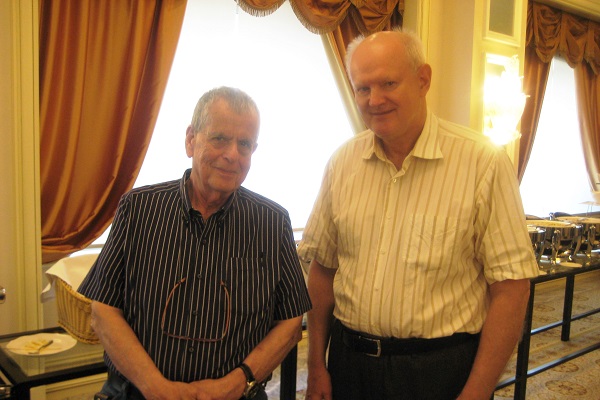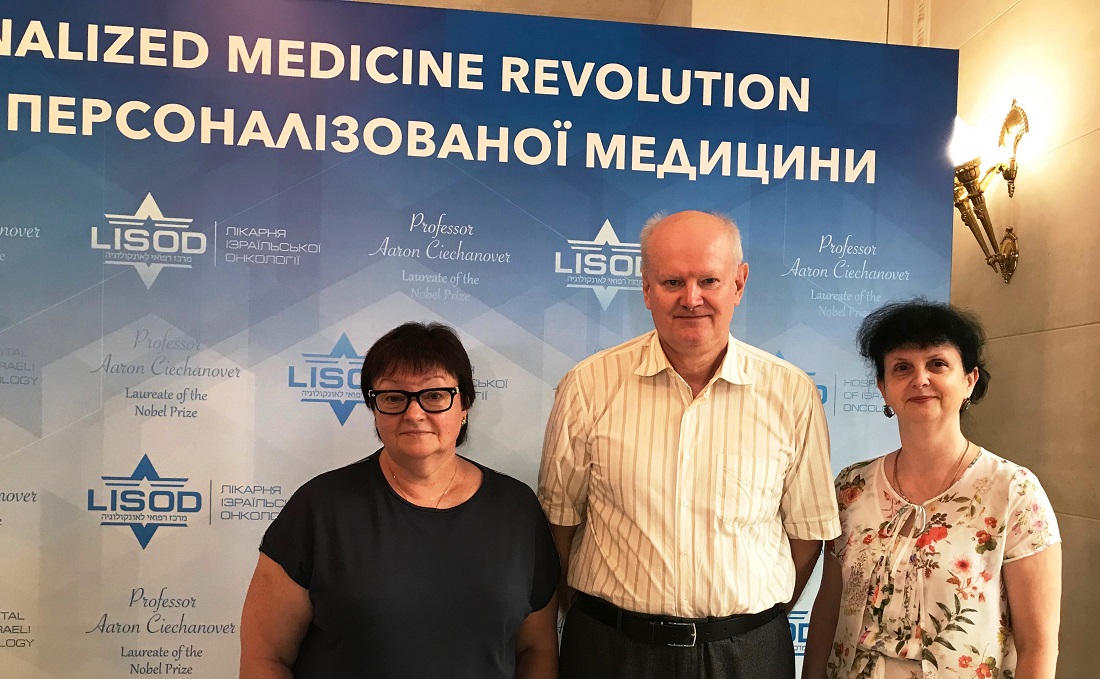The teachers of Department of Oncology in the Shupyk NMAPE – Chief of the Department Prof. Myasoyedov SD, Ass. Prof. PhD Ponomaryova OV, Dr Med Sci Tsip NP - 26 June 2019 yr took part in scientific oncological event, named «Revolution of personalized medicine. The thoughts exchange – lecture by Laureate of the Nobel Prize in chemistry (2004 yr.) А. Ciechanover», which took place in the City of Kyiv and was organized by «LISOD» Clinic (Іsrael).

In the event program were also presented the lecture, made by Prof. І. Wolf «New horizons in the cancer genomics» and the lecture, made by Prof. G. Мarkel «Moderm immune oncology: from basic principles towards clinical practice», аs well as the oncological panel (moderated by Prof. A. Kuten).
In his speech Prof. Ciechanover especially stressed, that oncological diseases together with the brain and vascular maladies, constitutes the most prevalent chronic disorders in general population. Cancer – it is a malady and complication of the patients long living. Prof. Ciechanover has presented his own views concerning the stages in development of a modern pharmacotherapy of oncological and other systemic diseases of a mankind – from incidental observations to total experimental investigation of therapeutic potential of the earth-planet compounds and up to the engineering of artificial molecules of targeted preparations. Personalized medicine is taking into account the genetic, epigenetic and the development peculiarities of a clinic-morphological entity. The participation medicine predeceases a quite complete informing of the patient about the disease diagnosis, the prediction factors and prognosis, and involving him into the clinical decision making. In modern USA the side effects of medicinal treatment occupy the 4-6th position among the leading causes of death in population studies. This tendency elimination depends on activity of medical associations in overcoming it.
Prof. Wolf І suggested, that nowadays, in accordance to molecular-genetic signs, 4-5 mostly prevalent forms of cancer are depicted only, what simplifies revealing of clinically relevant mutations. Precision oncology today constitute the available method due to introduction of the elaborated algorithm of a rational analysis for molecular-biological peculiarities of the tumor, which constitute background for conduction of a modern specific medicinal anticancer therapy. Today we prefer initial genetic testing of the tumor, consisting of subsequent search for high MSI and the NTRK fusion (which can drive unregulated cell growth and proliferation in a range of cancer types). Recently, this pathway gained significant focus and attention in precision oncology). Next-Generation Sequencing provides the most comprehensive view across a large number of genes and can identify the NTRK gene fusions as well as other relevant alterations, with minimal sample tissue needed. Every registered case of tumoral progression needs reintervention for biopsy to govern the therapy readjustment.
Prof. Мarkel G underlined the changing paradigm in medicinal therapy for cancer due to application of a new group of preparations for targeted immunocorrection. He highlighted a modern state of the problem of the cancer immunotherapy, including the results of investigations performed by himself. Today the results of introduction of immunocorrecting preparations in 13 localizations and forms of cancer are well known. Sophisticated substantiation of this trend in medicinal anticancer therapy consists of identification of the tumor-dependent mechanisms in the «own-foreign» determination system concerning DNA and proteins and facilitation of the immunogenic and the immune components functioning in this environment. There are a range of the procedures, enhancing antitumoral activity of Т-lymphocytes, investigating the best combinations and regimes of application of a certain targeted preparations with a still best chemotherapy. The last favorable results achieved while applying the antiangiogenesis targeting together with still the best conventional chemotherapy.



